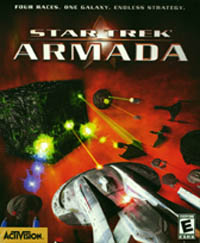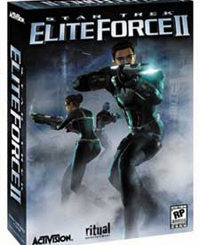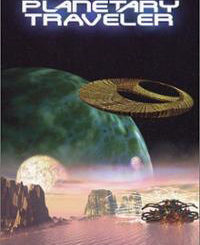 Star Trek: Armada
Star Trek: Armada
(Activision for the PC)
by Eric Johnson
No matter which series you speak of, combat between vessels in the Star Trek universe has overwhelmingly resembled space-bound submarine warfare rather than swarming dogfights. Large-scale space battles are generally absent across the board, except for situations where critically low ratings call for some blood to be spilled. Those few occasions where dozens of vessels tear into each other have provided some tantalizingly stunning visuals, and just may have provided some of the incentive behind the production of Star Trek: Armada, the first real-time strategy game produced under the Star Trek name.
“Real-time strategy” is a genre, almost exclusively relegated to the PC, where players build up military forces from the bottom up, exploring, gathering resources, building manufacturing facilities, and eventually confronting the enemy. Imagine a chess game where you only start off with two pawns and a king, then use those pawns to build the other pieces of the set, confronting your opponent only when you are ready to do business, and you’ll get a good idea of what real-time strategy is all about. It’s initially confusing, but tremendously addictive.
Although blatant unoriginality may seem like a significant drawback, in the case of Star Trek: Armada, quite the opposite is true. Slapping a cozy and familiar facelift on top of a well-established genre has produced an accessible, highly-recommended, and immensely enjoyable game. Excellent interface, good storyline, great ship design, plenty of action, and the vocal talents of the immortal Patrick Stewart keep Armada far away from the New Age quagmire that’s crippled the once mighty Star Trek franchise these past few years. Of course, just admitting you like Star Trek in any form can be as socially awkward as telling the world you just got diagnosed with herpes; but I’ll leave that debate for another day and concentrate on the here and now.
Taking place in the aftermath of a devastating war against an empire of shape-shifting tyrants known as the Dominion, clandestine activity and post-war territorial consolidation threatens an even more destructive outbreak of hostilities. The plot is complex and interesting enough to stand on its own as a two or three-part episode. Thankfully, it all revolves around the Next Generation crew, featuring the voices of Patrick Stewart and Michael Dorn. Concentrating on the four most popular species in the Star Trek menagerie, Armada puts the player in control of forces representing the Federation, Romulan, Klingon and mighty Borg empires. The single player campaign consists of twenty missions, five for each race, which gives you the opportunity to perform a variety of tasks exploiting the technological strengths of each group. An appropriate balance of special skills ensures the absence of any unfair advantage (although I have a preference for the Romulans).
Each empire has about nine types of facilities to build and eight potential ship designs to exploit. The facilities include research centers, shipyards, defensive platforms and mining stations — all are needed in the correct proportion to ensure victory. Vessels include scout ships, scientific vessels, cruisers, frigates, and mighty capital ships. The controls are as simplified and clear as possible, beginners will definitely have problems keeping track of things at first, but the single player campaign will get you standing on your own rather quickly. By the way, you’ll have to do most of the thinking for your ships, they’re not particularly smart, and although you can enable a higher level of independence, coordinating your attacks manually is really what the game is all about. Keep in mind, you’ll do a lot of frenzied clicking, especially against human opponents. I recommend generating large numbers of capital ships. Smaller vessels may be able to overwhelm a single Romulan Warbird or Borg Cube, but when attacking in force, the big guys will always win.
Virtually identical in setup and design to Warcraft, Starcraft or Myth (key titles within the genre), Armada has only one truly unique feature — each ship’s crew is a separate commodity from the vessel itself. In combat, the crew is well-protected so long as shields are intact. Once the defenses are down, the crew will begin to die off very quickly. As your opponent’s crew becomes scarce, some of your own crew members can be beamed aboard the enemy ship to seize control; in this manner, a small fleet of stolen enemy ships can be exploited, dramatically increasing the size and effectiveness of your fleet. Some scenarios even specifically involve collecting derelict vehicles and using them to your advantage.
In addition to the basic single player campaign, extensive online multiplayer options as well as quick action scenarios promise lots of raw material and hours of play time. Confrontations can take hours to complete depending on how you approach them and there are plenty of maps to keep things interesting.
My only complaints about this game essentially revolve around the basic shortcomings of the genre. Each scenario is an isolated engagement with no long-term rewards. Once advantage has been seized by one side, there’s no wild card to turn the tables. Also, I’d really like to see the inclusion of additional empires. Hopefully expansion sets will be produced and new campaigns generated. By the way, serious problems are present in installing the game straight out of the box, bad beta testing has resulted in the need for a patch that can be downloaded from the Activision website; without it extensive sound & graphics problems as well as frequent crashes will be encountered. With the beta patch, things will run well, but even on a very good system, the sharpest video settings will not run properly. The slightly rougher settings still look amazing and combat between vessels is still very exciting and crisp.
I’d like to thank Patrick Stewart for lending extensive voice work to the project; he’s the finest actor to have taken part in the franchise and is by no means desperate for work. His presence is a bonus. Star Trek: Armada may not be very original, but it’s borrowed the right elements from the best of the genre, and is the first title of its kind to really draw me in and hold my interest. As someone disgusted by the current state of televised Star Trek, it’s a great relief to find a game that does the wounded mythology proud.



